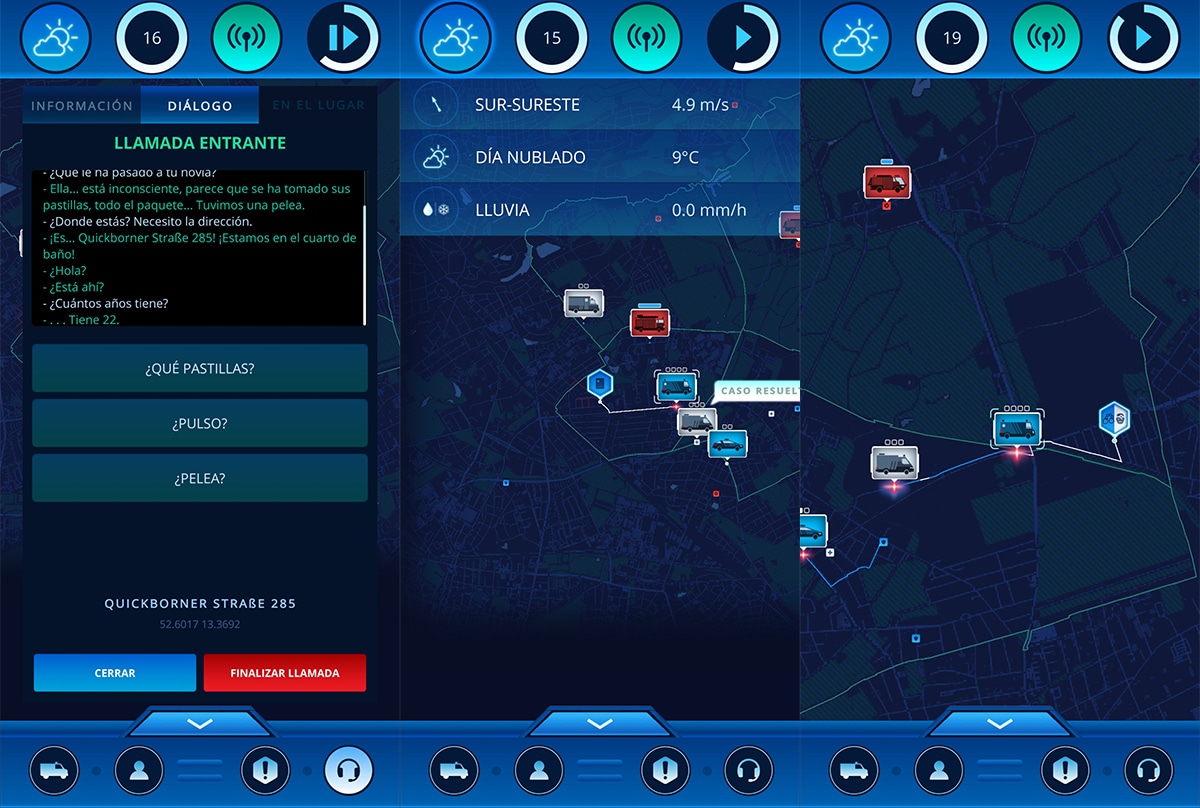

The immersive UI and strong voice acting performances carry the experience, recalling the tension of a real life-or-death situation. So if you’re in the mood for high-stakes management gameplay and don’t mind too much about a lack of replay value, then 112 Operator is a great game to capture the imagination.

I wonder about whether the recreation of recent events like the 2020 California bushfires could be interpreted as poor taste, but for what it’s worth these scenarios are handled maturely, without being sensationalised. The three difficulty modes do alleviate this problem somewhat, as do the special scenarios which model real-world catastrophes. It’s a similar problem to most work simulators, but exacerbated here because there’s little in the way of economic simulation: the better the player does, the more boring the game becomes. But if the player is confidently succeeding, then the game is just busywork – there are no stakes, and no way to exceed expectations. It’s a powerful narrative when the player is struggling and on the razor’s edge between life and death. This is arguably the biggest failing of 112 Operator’s gameplay loop. While this is useful as it provides accurate advice on what to do next time, it does rob the game of any gravity if, on the next attempt, the player knows all the answers. Lose states in this game sure are unpleasant.Īt the end of each day of work, players can look through the various situations and see whether they earned or lost points based on their handling of each situation. The city’s morale goes down, and your superiors start sending passive-aggressive emails to your inbox – you’ll eventually lose funding for your vehicles and things start to fall apart from there. If you make a bad decision, there’s no one to clean up for you. Fire engines will willingly drive-by fires if you command them to, and the phone could remain unanswered if so inclined. It is, in universe, a bit weird that the emergency operator is the single point of failure for an entire city’s emergency infrastructure. Whereas in real life there’s no way that an emergency services operator wouldn’t be trained on those details beforehand, Jutsu Games exploits the average person’s inexperience with critical situations to force a few early disasters and show that it means business. An interesting, cruel factor is that many of the game’s mini-scenarios are based on real-world situations so if the player doesn’t know what to do in case of a gas leak or an engine stall in a busy highway, they won’t be able to give the advice that saves the caller. This is a game where people can die, and you’ll find this out early. The game can and will fail the player in a variety of circumstances, whether it’s giving the wrong advice on a phone call, or failing to provide critical services in time.

I can’t make many comments about whether the game is realistic, but I do appreciate the way the narrative refuses to pull punches in its depiction of emergency situations. As emergencies ramp up in severity and resources become scarcer, players will be challenged to triage and adapt to unexpected changes in order to best serve their city. Players take charge of a limited number of emergency vehicles and must distribute them efficiently across a growing jurisdiction of streets as the game develops. In this game, players field phone calls and tipoffs to direct a fleet of police, fire engines and ambulances to keep a real-world city safe and secure.Īt its heart, 112 Operator is a resource management game. So when Jutsu Games’ 112 Operator promised the responsibility with none of the real-world consequences, I was intrigued. Emergency operations sounds like it could be a fascinating job, but I know that I’d never be able to cope with the stress that emergency services providers are constantly under every day.


 0 kommentar(er)
0 kommentar(er)
